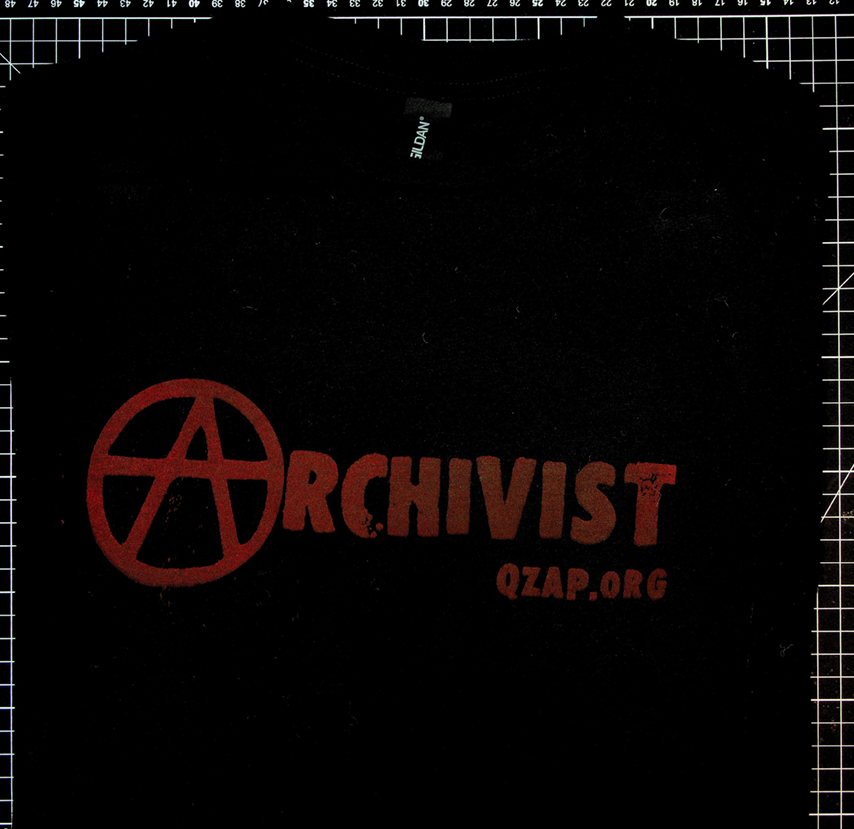
We’ve crossposted our annual World AIDS Day post to Instagram. This year is a look at some pages from the queer anarchist zine PATS. PATS ran for 28 issues from the summer of 1992 through December of 1999. Published by Frankie, Christine and Oscar in Utrecht, The Netherlands, the majority of the zine is in Dutch with some English and French smatterings.
ID1: From PATS No.3 (Summer 1993), an illustration of a priest nailing Christ to the cross, the word Queer over his head, and the text “AIDS, Unlike Homophobia, Cannot Be Spread Through Casual Contact”
ID2: From PATS No.7 (August 1994), a flyer from ACT UP New York in Spanish for a demonstration during the 25th anniversary of the Stonewall Riots. Text in English reads “STONEWALL DESPERATE TIMES. DESPERATE ACTIONS. AIDS ON THE STREET! SUN JUNE 26 ’94 10AM: SHERIDAN SQ—>CENTRAL PK”
ID3: A review of Pansy Division’s album Deflowered and the printed lyrics to their song Denny, about a man who’s sick with opportunistic infections as a result of having AIDS.
ID4: From PATS No.9 (March 1995) – A fundraising appeal for ACT UP – Amsterdam – Image depicts a person screaming and the translated text reads “STILL AIDS! SEE, HEAR and SCREAM! ACT UP!”
ID5: From PATS No.12 (December 1995) – An blurb about ACT UP/SF storming the San Francisco offices of the Republican Party and burning Senator Jesse Helms in effigy next to a sticker that says The AIDS Crisis is Not Over. On the lower half is a piece about the 8th annual World AIDS day event happening in Utrecht.
ID6: A photo postcard of a colorful banner that says ACT UP – Utrecht
ID7: From PATS No.8 (December 1994) – An article about an action that ACT UP – Utrecht members participated in at the Forbidden Fruits of Civil Society Festival from Sept. 8-18, 1994 in Slovenia teaching safer sex practices.
ID8: From PATS No.8 (December 1994) – A continuation of the previous page and some graphic propaganda including images of unrolled condoms.
ID9: From PATS No.20 (December 1997) – Making Dams for Beavers – illustrated instructions on how to make barriers for performing safer oral sex on orifices using latex gloves.
ID10: Photo of a mural that says “ACT UP! Bi Queer!” over an anarchist circle-A with a pink triangle. Floating around the image are Keith Haring-esque characters and pink triangles with lightning bolts indicating that this probably came from a squatted space.


 Even before the COVID-19 pandemic began we were thinking about trying to write a thing about zines that talk abut using herbs and DIY abortion. Then came the pandemic, and in the U.S., the confirmation of another anti-abortion supreme court justice, who, it’s speculated, will work to overturn the 1973 Roe vs. Wade decision that legalized pregnancy termination.
Even before the COVID-19 pandemic began we were thinking about trying to write a thing about zines that talk abut using herbs and DIY abortion. Then came the pandemic, and in the U.S., the confirmation of another anti-abortion supreme court justice, who, it’s speculated, will work to overturn the 1973 Roe vs. Wade decision that legalized pregnancy termination. In 1992, the drag queen Joan Jett Blakk ran for presidential office with backing from Queer Nation. Using the slogan “Lick Bush in ‘92,” Blakk’s campaign brought national attention to issues impacting queer communities, particularly the AIDS epidemic that the federal government was completely ignoring1.
In 1992, the drag queen Joan Jett Blakk ran for presidential office with backing from Queer Nation. Using the slogan “Lick Bush in ‘92,” Blakk’s campaign brought national attention to issues impacting queer communities, particularly the AIDS epidemic that the federal government was completely ignoring1. In an article entitled “Every Breathing Moment,” Michael Palmer describes the institutional violence enacted against trans bodies. Palmer writes about endless visits to doctors who challenged his identity as a trans man and refused to provide top surgery. He writes that “listening” to doctors or family would have meant turning toward death. Palmer describes breathing as a radical act—an assertion of life in institutional spaces that negate trans lives.
In an article entitled “Every Breathing Moment,” Michael Palmer describes the institutional violence enacted against trans bodies. Palmer writes about endless visits to doctors who challenged his identity as a trans man and refused to provide top surgery. He writes that “listening” to doctors or family would have meant turning toward death. Palmer describes breathing as a radical act—an assertion of life in institutional spaces that negate trans lives.

 It’s easy to get discouraged. Easy, and understandable. At times like these, it can be helpful to look back and see how others handled times of crisis. YELL is unfortunately, at the moment, defunct. However, its achievements (as listed near the beginning of YELL #1) are nothing short of inspiring. From handing out condoms and safer sex literature to over 45,000 NYC students, to enacting change in NYC public education policy, to representing youth interests at the international conference on AIDS, it’s clear the body of this organization was just as energetic as its publication.
It’s easy to get discouraged. Easy, and understandable. At times like these, it can be helpful to look back and see how others handled times of crisis. YELL is unfortunately, at the moment, defunct. However, its achievements (as listed near the beginning of YELL #1) are nothing short of inspiring. From handing out condoms and safer sex literature to over 45,000 NYC students, to enacting change in NYC public education policy, to representing youth interests at the international conference on AIDS, it’s clear the body of this organization was just as energetic as its publication.



